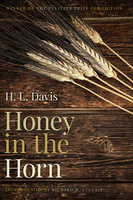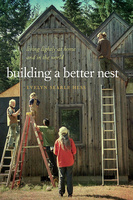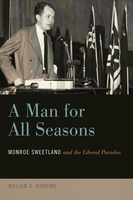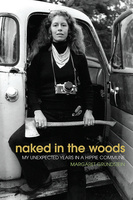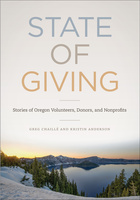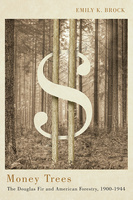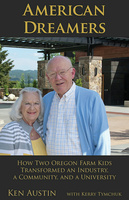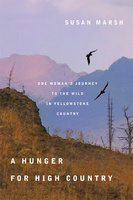Showing 166-180 of 413 items.
Honey in the Horn
By H.L. Davis; Foreword by Richard W. Etulain
Oregon State University Press
Set in Oregon in the early years of the twentieth century, H. L. Davis’s Honey in the Horn chronicles the struggles faced by homesteaders as they attempted to settle down and eke out subsistence from a still-wild land. With sly humor and keenly observed detail, Davis pays homage to the indomitable character of Oregon’s restless people and dramatic landscapes without romanticizing or burnishing the myths.
An essential book for all serious readers of Northwest literature, this classic coming-of-age novel has been called the “Huckleberry Finn of the West.” It is the only Oregon book that has ever won a Pulitzer Prize for fiction. With a new introduction by Richard W. Etulain, this path-breaking work from one of Oregon’s premier authors is once again available for a new generation to enjoy.
An essential book for all serious readers of Northwest literature, this classic coming-of-age novel has been called the “Huckleberry Finn of the West.” It is the only Oregon book that has ever won a Pulitzer Prize for fiction. With a new introduction by Richard W. Etulain, this path-breaking work from one of Oregon’s premier authors is once again available for a new generation to enjoy.
Building a Better Nest
Living Lightly at Home and in the World
Oregon State University Press
For fifteen years, Evelyn Hess and her husband David lived in a tent and trailer, without electricity or running water, on twenty acres of wild land in the foothills of the Oregon Coast Range. When they decided to build a house – a real house at last – they knew it would have to respect the lessons of simple living that they learned in their camping life. They knew they could not do it alone. Building a Better Nest chronicles their adventures as they begin to construct a house of their own, seeking a model for sustainable living not just in their home, but beyond its walls.
What does it mean to build a better nest? Better for whom? Is it better for the individual or family? The planet? Green building and sustainable design are popular buzzwords, but to Hess, sustainable building is not a simple matter of buying and installing the latest recycled flooring products. It is also about cooperative work: working together in employment, in research, in activism, and in life. Hess is concerned with her local watershed, but also with the widening income gap, disappearing species, and peak resources. She actively works to reduce overconsumption and waste. For Hess, these problems are both philosophical and practical.
As Hess and her husband age, the questions of how to live responsibly arise with greater frequency and urgency. With unfailing wit and humor, she looks for answers in such places as neuroscience, Buddhism, and her ancestral legacy. Building a Better Nest will appeal to anyone with an interest in sustainable building, off-grid living, or alternative communities. The questions it asks about the way we live are earnest and important, from an author whose voice is steeped in wisdom and gratitude.
What does it mean to build a better nest? Better for whom? Is it better for the individual or family? The planet? Green building and sustainable design are popular buzzwords, but to Hess, sustainable building is not a simple matter of buying and installing the latest recycled flooring products. It is also about cooperative work: working together in employment, in research, in activism, and in life. Hess is concerned with her local watershed, but also with the widening income gap, disappearing species, and peak resources. She actively works to reduce overconsumption and waste. For Hess, these problems are both philosophical and practical.
As Hess and her husband age, the questions of how to live responsibly arise with greater frequency and urgency. With unfailing wit and humor, she looks for answers in such places as neuroscience, Buddhism, and her ancestral legacy. Building a Better Nest will appeal to anyone with an interest in sustainable building, off-grid living, or alternative communities. The questions it asks about the way we live are earnest and important, from an author whose voice is steeped in wisdom and gratitude.
At the Hearth of the Crossed Races
A French-Indian Community in Nineteenth-Century Oregon, 1812-1859
Oregon State University Press
Despite the force of Oregon’s founding mythology, the Willamette Valley was not an empty Eden awaiting settlement by hardy American pioneers. Rather, it was, as Melinda Jetté explores in At the Hearth of the Crossed Races, one of the earliest sites of extensive intercultural contact in the Pacific Northwest. Jetté’s study focuses on the “hearth” of this contact: French Prairie, so named for the French-Indian families who resettled the homeland of the Ahantchuyuk Kalapuyans. This history of French Prairie provides a window into the multi-racial history of the Pacific Northwest and offers an alternative vision of early Oregon in the lives of the biracial French-Indian families whose community challenged notions of white supremacy, racial separation, and social exclusion.
A Man for All Seasons
Monroe Sweetland and the Liberal Paradox
Oregon State University Press
The life of prominent Oregon political leader Monroe Sweetland spans the spectrum of 20th-century America. Through seven decades, Sweetland experienced the economic collapse of the Great Depression, the unparalleled violence of a nation at war, the divisiveness of Cold War politics, and the cultural and political turmoil of the Vietnam War. Historian William G. Robbins illuminates the wrenching transformation of American political culture in A Man for All Seasons: Monroe Sweetland and the Liberal Paradox. Robbins’ portrait is holistic, exploring Sweetland’s socialist beginnings, inconsistencies in his politics—especially during the Cold War—and his regional and national legacy.
Naked in the Woods
My Unexpected Years in a Hippie Commune
Oregon State University Press
In 1970, Margaret Grundstein abandoned her graduate degree at Yale and followed her husband to a commune in the backwoods of Oregon. Together with ten friends and an ever-changing mix of strangers, they began to build their vision of utopia. Naked in the Woods chronicles Grundstein’s shift from reluctant hippie to committed utopian. Grundstein, (whose husband left, seduced by “freer love”) faced tough choices. Could she make it as a single woman in man’s country? Did she still want to? Although she reveled in the shared transcendence of communal life, disillusionment slowly eroded the dream. Brotherhood frayed when food became scarce. Rifts formed over land ownership. Dogma and reality clashed.
Many people, baby boomers and millennials alike, have romantic notions about the 1960s and 70s. Grundstein’s vivid account offers an unflinching, authentic portrait of this iconic and often misreported time in American history. Accompanied by a collection of distinctive photographs she took at the time, Naked in the Woods draws readers into a period of convulsive social change and raises timeless questions: how far must we venture to find the meaning we seek, and is it ever far out enough to escape our ingrained human nature?
Many people, baby boomers and millennials alike, have romantic notions about the 1960s and 70s. Grundstein’s vivid account offers an unflinching, authentic portrait of this iconic and often misreported time in American history. Accompanied by a collection of distinctive photographs she took at the time, Naked in the Woods draws readers into a period of convulsive social change and raises timeless questions: how far must we venture to find the meaning we seek, and is it ever far out enough to escape our ingrained human nature?
Toward a Natural Forest
The Forest Service in Transition (A Memoir)
By Jim Furnish; Foreword by Char Miller
Oregon State University Press
The Forest Service stumbled in responding to a wave of lawsuits from environmental groups in the late 20th Century—a phenomenon best symbolized by the spotted owl controversy that shut down logging on public forests in the Pacific Northwest in the 1990s. The agency was brought to its knees, pitted between a powerful timber industry that had been having its way with the national forests for decades, and organized environmentalists who believed public lands had been abused and deserved better stewardship. Toward a Natural Forest offers an insider’s view of this tumultuous time in the history of the Forest Service, presenting twin tales of transformation, both within the agency and within the author’s evolving environmental consciousness. Drawing on the author’s personal experience and his broad professional knowledge, Toward a Natural Forest illuminates the potential of the Forest Service to provide strong leadership in global conservation efforts. Those interested in our public lands—environmentalists, natural resource professionals, academics, and historians—will find Jim Furnish’s story deeply informed, thought-provoking, and ultimately inspiring.
State of Giving
Stories of Oregon Nonprofits, Donors, and Volunteers
By Greg Chaillé and Kristin Anderson
Oregon State University Press
State of Giving is a survey of the urgent challenges facing Oregon’s communities, and the central role that nonprofits, philanthropists, and volunteers play in their resolution. There are ways in which we all—regardless of age, wealth, location, or background—can give back to our communities, and the need for such engagement is great. In addition to introducing Oregon’s key areas of need and demonstrating diverse pathways into civic engagement, the book provides resources for prospective volunteers and donors seeking to maximize their impact. Ultimately, State of Giving makes the case for nonprofits and their supporters as undervalued pillars of civic structure, as cornerstones of progress, and as crucial to the future of a prosperous Oregon. It’s an accessible call-to-arms, and an essential text for anyone interested in strengthening their community and their state.
Silviculture and Ecology of Western U.S. Forests
Oregon State University Press
Silviculture and Ecology of Western U.S. Forests, Second Edition, is a text for students, professional forest managers, and scientists that summarizes both early and contemporary research and principles relevant to the silviculture, ecology, and multi-purpose management of western U. S. forests. Based on its authors’ significant experiences and contributions in the field, as well as nearly 1000 additional references, Silviculture and Ecology remains the only text that focuses on silviculture in western U.S. forests—providing background and basis for current biological, ecological, and managerial practices. In this comprehensive reference, readers entering the field will come to understand the significance of carefully managing forests by conscious design, and experienced silviculturists will benefit from the edition’s up-to-date information, providing forest users with a greater range of ecosystem services and consumable products alike.
Money Trees
The Douglas Fir and American Forestry, 1900-1944
Oregon State University Press
Money Trees is an interdisciplinary history of the crucial decades that shaped the modern American conception of the value of the forest. It begins with early 20th century environmental changes in the Douglas Fir forests of the Pacific Northwest, which led to increasing divisiveness and controversy among foresters. Brock balances this regional story with a national view of the intellectual and political currents that governed forest management, marshaling archival evidence from industry, government, and scientific sources.
An important contribution to environmental scholarship, Money Trees offers a nuanced vision of forestry’s history and its past relationship to both wilderness activism and scientific ecology. With fresh perspectives on well-known environmental figures such as Bob Marshall and Gifford Pinchot, it will add to the conversation among scholars in environmental history, history of science, and the history of the American West. It will be welcomed as a key resource across the spectrum of environmental studies, and by anyone interested in natural resources, land management, the role of science in environmentalism, and the modern wilderness movement.
An important contribution to environmental scholarship, Money Trees offers a nuanced vision of forestry’s history and its past relationship to both wilderness activism and scientific ecology. With fresh perspectives on well-known environmental figures such as Bob Marshall and Gifford Pinchot, it will add to the conversation among scholars in environmental history, history of science, and the history of the American West. It will be welcomed as a key resource across the spectrum of environmental studies, and by anyone interested in natural resources, land management, the role of science in environmentalism, and the modern wilderness movement.
Environment and Society in the Japanese Islands
From Prehistory to the Present
Edited by Bruce L. Batten and Philip C. Brown
Oregon State University Press
Over the long course of Japan’s history, its people profited from their rich natural environment while simultaneously facing significant environmental challenges. Over time, they have altered their natural environment in numerous ways, from landscape modification to industrial pollution. How has the human-nature relationship changed over time in Japan? How does Japan’s environmental history compare with that of other countries, or that of the world as a whole?
Environment and Society in the Japanese Islands attempts to answer these questions through a series of case studies by leading Japanese and Western historians, geographers, archaeologists, and climatologists. These essays, on diverse topics from all periods of Japanese history and prehistory, are unified by their focus on the key concepts of “resilience” and “risk mitigation.” Taken as a whole, they place Japan’s experience in global context and call into question the commonly presumed division between pre-modern and modern environmental history.
Primarily intended for scholars and students in fields related to Japan or environmental history, these accessibly-written essays will be valuable to anyone wishing to learn about the historical roots of today’s environmental issues or the complex relationship between human society and the natural environment.
Environment and Society in the Japanese Islands attempts to answer these questions through a series of case studies by leading Japanese and Western historians, geographers, archaeologists, and climatologists. These essays, on diverse topics from all periods of Japanese history and prehistory, are unified by their focus on the key concepts of “resilience” and “risk mitigation.” Taken as a whole, they place Japan’s experience in global context and call into question the commonly presumed division between pre-modern and modern environmental history.
Primarily intended for scholars and students in fields related to Japan or environmental history, these accessibly-written essays will be valuable to anyone wishing to learn about the historical roots of today’s environmental issues or the complex relationship between human society and the natural environment.
For the Love of Rivers
A Scientist's Journey
Oregon State University Press
In For the Love of Rivers, stream ecologist Kurt Fausch draws readers across the reflective surface of streams to view and ponder what is beneath, and how they work. While celebrating their beauty and mystery, he uses his many years of experience as a field biologist to explain the underlying science connecting these aquatic ecosystems to their streamside forests and the organisms found there—including humans. More than a book about stream ecology, For the Love of Rivers is a celebration of the interconnectedness of life. It is an authoritative and accessible look at the science of rivers and streams, but it also ponders the larger questions of why rivers are important to humans, why it is in our nature to want to be near them, and what we can do now to ensure the future of these essential ecosystems.
American Dreamers
How Two Oregon Farm Kids Transformed an Industry, a Community, and a University
By Ken Austin; Other primary creator Kerry Tymchuck
Oregon State University Press
Autobiography of Ken Austin, Oregon philanthropist and founder of A-dec.
Learning to Like Muktuk
An Unlikely Explorer in Territorial Alaska
Oregon State University Press
A Hunger for High Country
One Woman’s Journey to the Wild in Yellowstone Country
By Susan Marsh
Oregon State University Press
Morning Light
Wildflowers, Night Skies, and Other Ordinary Joys of Oregon Country Life
Oregon State University Press
Stay Informed
Subscribe nowRecent News

